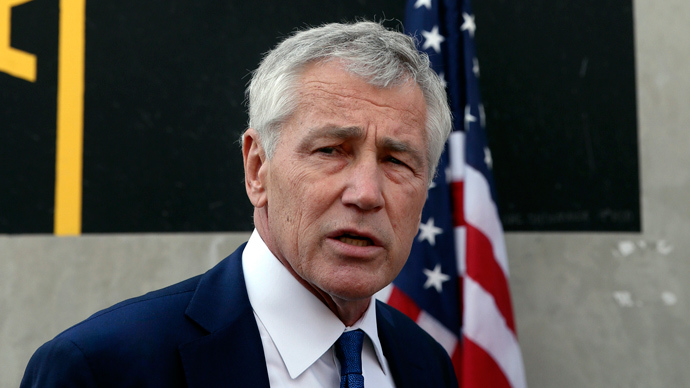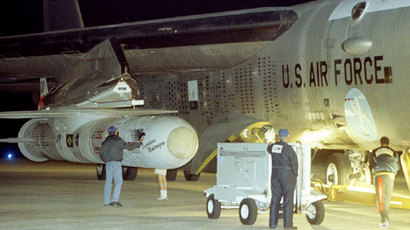Nuclear officers busted for drugs while Hagel gives motivational speech

Two United States Air Force officers involved in the nation’s nuclear missile program have been stripped of their security clearances and temporarily suspended while the military investigates allegations involving illegal drugs.
The two men — both officers at a Montana facility where the Pentagon’s Minuteman 3 intercontinental ballistic missiles are controlled from — are suspected of possessing narcotics, representatives for the military admitted to reporters late Thursday. The Air Force Office of Special Investigations has opened a probe into the allegations, and both unnamed officers have in the interim been relieved of their access to classified information.
News of the investigation broke on Thursday moments before Defense Secretary Chuck Hagel was set to deliver what the Associated Press considered a “carefully planned pep talk” to missilers at one of the two other facilities in the country that hosts ICBM forces amid reports of low morale within their ranks.
Speaking directly to the troops at the F.E. Warren Air Force Base in Nebraska , Hagel told the missilers, "We depend on your professionalism.”
"You are doing something of great importance to the world," the AP quoted Hagel as saying. "You have chosen a profession where there is no room for error — none."
“They do feel unappreciated many times,” he told members of the press after the engagement, the Los Angeles Times reported. “They are stuck out in areas where not a lot of attention is paid. And I know they wonder more than occasionally if anybody's paying attention.”
But across the state border in Montana at the Malmstrom Air Force Base, investigators are now left wondering what damage could have been caused by the latest breach in security to be suffered by the nation’s nuclear missile program.
Just last August, an audit of that facility conducted by the Global Strike Command ended with Malmstrom receiving an “unsatisfactory” rating, which yielded the termination of the officer in charge of the base’s security force shortly thereafter. Then in October, the deputy commander of the US nuclear forces was terminated from that position amidst an investigation involving his alleged use of counterfeit chips at a casino.
That same month, the Air Force acknowledged that they had been forced to discipline two crew members at Malmstrom after one of them was caught leaving a door at the secure facility ajar.
But the latest embarrassment for the nuke forces comes less than a month after the Air Force published a shocking report on Major General Michael Carey — the officer previously in charge of all three wings of the nuclear missile program and the military’s 450 ICBMS — in which he was accused of going on a drunken bender during a July 2013 trip to Moscow. That 42-page report, published in mid-December, accused the officer of consuming alcohol “to the extent that it impacted his conduct during briefings” and other outings while overseas, and even included allegations that he entertained, in his words, “hot women,” while on assignment. Carey was ultimately fired.
Now as the fate of the two Malmstrom officers rests in the Air Force investigation, the missile program itself has been yet again jeopardized by allegations involving military personnel at the heart of one of the Pentagon’s most sensitive programs.
Last month, the Congressional Budget Office estimated that the current administration’s plans for the nation’s nuclear forces will cost upwards of $355 billion during the next decade.
Hagel did not touch on the drug probe during his remarks in Nebraska, which was reported to him only minutes before he addressed the audience.














